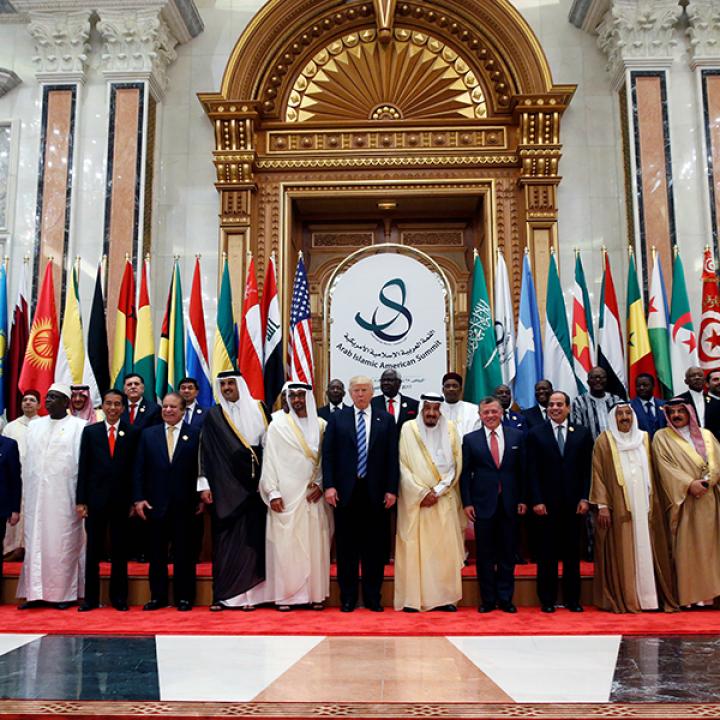
- Policy Analysis
- Articles & Op-Eds
A Sunni Anti-Extremism Coalition Headed by the Saudis?

The newly proposed coalition is unsustainable because many Muslim-majority countries have conflicting agendas, but the United States can still push for mutual legal reform.
In his speech at the Arab Islamic American Summit in Riyadh on Sunday, President Trump endorsed the idea of an Arab Sunni coalition to confront Iranian aggression and fight extremism. The coalition, as sketched, would encompass Saudi Arabia, United Arab Emirates, Jordan, Egypt and other Sunni states.
This coalition is unlikely to be effective, and could even disintegrate quickly due to the lack of shared threats and interests and disagreements on approaches to the main stated mission, countering Iran and extremism. Moreover, the U.S. is likely to depend on Saudi Arabia to lead and dominate this Sunni coalition -- causing frictions among states such as Egypt and Qatar that are likely to object to any Saudi-led project.
Effective coalitions like the North Atlantic Treaty Organization succeed due to all the original members sharing the same values, threats and interests. This initial unity of purpose is what led the NATO countries to successfully adopt unified policies to confront the Soviet threat and willingly accept U.S. domination of the alliance. This emerging Sunni coalition lacks all of these characteristics, rendering it to be ineffective and, at best, an alliance in name only.
Different approaches to Iran best explain variations in Arab countries' interests and threats. The governments of Saudi Arabia and UAE view Iran as the primary threat to their regimes. Countries such as Kuwait, Egypt and Oman adopt a less hostile approach toward Iran and are willing to accommodate Iranian interests.
Arab states also adopt dramatically different approaches to extremism. Qatar and Saudi Arabia support and fund political Islamists to advance their interests, and advocate integrating Islamists in the political process to stabilize the region and combat extremism. Qatar, in particular, views the integration of political Islamists in the political systems as part of the solution to the region's problems.
The UAE and Egypt, in contrast, adopt a very hostile and aggressive approach toward Islamist forces and seek to undermine their power in the region. They vehemently refuse calls to tolerate and accommodate the rise of Sunni Islamists. Both states view Islamists as part of the problem, not the solution, and regard them as an existential threat to the Egyptian and Emirati regimes. Meanwhile, Jordan adopts a more balanced approach toward political Islamists due to its internal domestic dynamics.
Additionally, the form of Islam practiced in Arab countries varies from state to state, complicating U.S. efforts to adopt effective and unified policies toward extremism in the region. Moreover, President Trump's reliance on Saudi Arabia to lead the charge on counterextremism exaggerates the influence of Saudi Arabia's version of Islam. Saudi Arabia practices a sectarian and austere form of religion that incites violence against religious minorities and other forms of Islam. The Saudi version of Islam is not mainstream even in the Gulf countries; the Omani and Emirati version of Islam is more tolerant than other members of the Gulf Cooperation Council. For example, Hindu temples exist in UAE, Bahrain and Oman -- as opposed to Saudi Arabia, where non-Islamic worship places are not allowed. Meanwhile, countries such as Egypt and Jordan practice a version of Islam that is more tolerant of religious minorities and less sectarian.
With such divergent philosophies, there's no shared understanding of what extremism is -- rendering the imagined coalition incoherent and ineffective in the fight against it. So, if not an alliance, what will work? The Trump administration should encourage Arab countries to reform their legal codes to allow for the rise of a counter-narrative against Islamism. The U.S. should push Arab countries toward the adoption of a neutral position in the face of secularists and condemn attempts to Islamize their societies. Currently, Arab leaders seek to preserve their regimes by winning political support of religious clerics through the tolerance of Islamists' hateful speech, Islamization efforts and silencing secularists.
And unlike the Obama administration, the Trump administration should adopt a harsher line with Arab countries that silence secular religious reformers under the auspices of blasphemy laws advocated by Islamists. An Egyptian religious reformist, Islam Behery, was jailed for one year for defaming religion in 2015 without any protests from the U.S. Allowing secularism to flourish through tolerance of free speech is the way forward in the Middle East.
Meanwhile, the U.S. could establish a coalition of states for whom Iran presents a clear and direct danger -- such as Saudi Arabia, Turkey, and the UAE. But don't pretend this is a Sunni alliance against extremism; that won't get us anywhere.
Haisam Hassanein is a Glazer Fellow at The Washington Institute. Wesam Hassanein, his brother, is a master's candidate at American University's School of International Service.
New York Daily News



